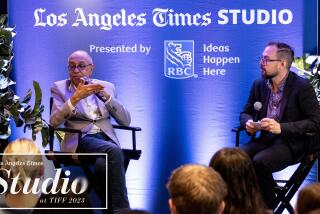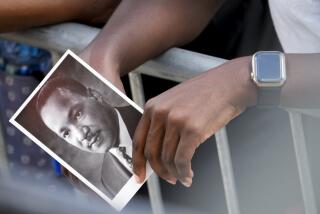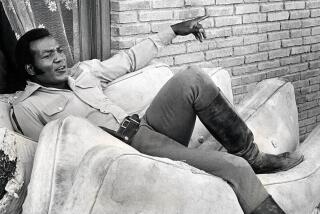MOVIE REVIEW : ‘SHERMAN’S MARCH’ GOES A-WOOING
Two-thirds of the way through, the original and sneakily endearing “Sherman’s March” (opening at the Nuart today for one week) bursts wide open. We watch as Harvard-based documentarian Ross McElwee, planning a 1981 film about the lingering effects of William Tecumseh Sherman’s calamitous march, gets hopelessly off the track when his girlfriend abandons him.
Bruised and broody, he goes home to the comfortable surroundings of his North Carolina clan to sort things out. There, his younger sister, newly married and affectionately bossy, points out that a camera makes even an untidy Harvard film school teacher a magnetic figure, and suggests that he make the most of it. So McElwee, lanky, bespectacled and bearded, with a face you might find in a Civil War daguerreotype, goes on the road, combining scholarship with a dogged and astonishingly optimistic search for love.
There is no lack of candidates, and we sort them out with McElwee, one at a time, but the explosion comes from blond, buxom Charleen Swansee, no candidate herself but a great friend and former teacher of McElwee’s. Charleen is monumental, savvy, glowing; she’s Ann Sothern, Joan Blondell and Dolly Levi all at once, a one-woman matchmaking whirlwind. She has Deedee, a folk singer she considers the perfect woman for McElwee, and she has McElwee’s number.
Charleen accuses him of being boring (it has occurred to us), depressing (“It’s so conspicuous if your car doesn’t work”), of hiding behind his camera (“This is not art--this is life!”) and, most deadly sin of all, of lacking voltage (“How can you be a film maker if you don’t have passion!?”).
Most of the rest of her suggestions strain the bounds of a family newspaper; they are pointed and Rabelaisian and they make you hope that Mr. Swansee fully appreciates the treasure he has at home. Alas, it’s a little harder for McElwee to capitulate to sweet-faced Deedee, who turns out to be a Mormon survivalist whose dowry will include a better-than-average chance of surviving nuclear attack in her tidily stocked bomb shelter.
Scrub Deedee. It does leave a rather wide field of Southern womanhood that begins with Pat, a desultory actress, who pursues cellulite with an ardor that Gen. Sherman would certainly admire and who leaves McElwee to pursue a bit part with Burt Reynolds. Next there is Wini, a nifty and self-sufficient linguist; Claudia, an interior decorator/divorcee with a daughter; Joyous, a great girl singer whom we meet performing “Respect” in a Sears parking lot in red Spandex pants, and ex-girlfriend and golden girl Karen, confused about whether she loves another.
Something happens with each one. Frequently lassitude. McElwee may be a lover (if he is, he finally put down that camera because we, quite properly, aren’t privy to it--it isn’t that kind of film), but he’s no fighter. He’s a drifter: sweet, neurotic, insomniac and introspective. He’s genuinely concerned about life in the nuclear age: The movie’s subtitle, “A Meditation on the Possibility of Romantic Love in an Era of Nuclear Weapons Proliferation,” pinpoints its underlying plaint. He’s also mordantly humorous: “I begin to think that my real life has fallen into a crack between my life and the film.”
Two of the reasons to stick it out with McElwee for the film’s full 155 minutes is his genuine affection for these women, and the women themselves, who become a composite picture of the battiest and brightest of the early 1980s.
There is also the film maker’s owlish portrait of his success as a lover: McElwee’s Punctured Romance(s). But can you not be captivated, as McElwee wades out into the swampy mire at the very spot from which Sherman’s troops fired on the capital building--and unsteadily disappears from sight? Or when you read that he has an earlier film, entitled “Charleen,” about “Sherman’s March’s” undeniable star. The line to see that one starts right here.
And have we got a woman for Ross McElwee: smart, warm, beautiful--and a film editor.
‘SHERMAN’S MARCH: AN IMPROBABLE QUEST FOR LOVE’
Produced, filmed, sound recorded, edited by Ross McElwee. Assistant editors Kate Davis, Alyson Denny, Meredith Woods. Narration written, spoken by McElwee. Introductory historical narration Richard Leacock.
Times-rated: Mature.
Running time: 2 hours, 35 minutes.
More to Read
Only good movies
Get the Indie Focus newsletter, Mark Olsen's weekly guide to the world of cinema.
You may occasionally receive promotional content from the Los Angeles Times.










